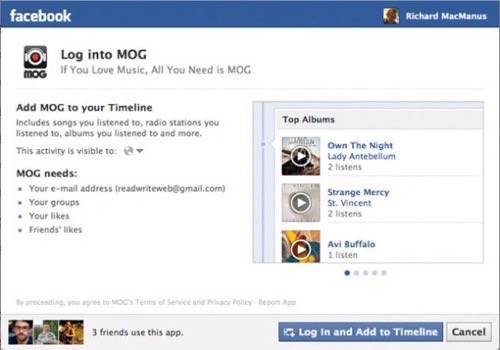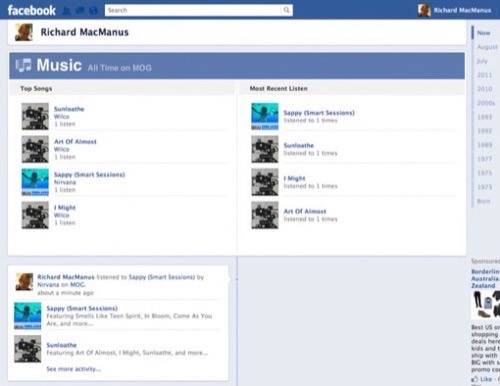One of the most controversial aspects of Facebook’s re-design announcements last week was the introduction of “frictionless sharing.” That’s Facebook’s term for when something you are reading, listening to or watching is automatically shared to your Facebook Timeline. Up till now, sharing on the social Web has largely been a manual process. You click a Facebook “Like” button, you click the “Check In” button in Foursquare, you click a button to “Re-Tweet” something. With Facebook’s frictionless sharing, once you approve a media partner app, all of your activity in that app is automatically shared to Facebook. No need to click any buttons.

Frictionless sharing may well turn out to be a masterstroke by Facebook (I actually think it will). But because this is a relatively new concept, people rightly have concerns about it. In this post we’ll review the pros and cons, so that you can decide for yourself whether to enable automated sharing.
Firstly, let’s look at how this works. I’m going to use music as an example, but note that music sharing is geo-restricted. My country is one of those which doesn’t have access to frictionless sharing of music, but for research purposes I found a temporary workaround. So here’s what happens…
Using the online music service MOG as an example, when you connect MOG to Facebook (via the settings on MOG’s website) you are giving it permission to share all of the songs you listen to.

When you listen to songs in MOG, each song is automatically posted into your Facebook Timeline:

Once you’ve listened to a few songs, Facebook pops a Music dashboard into your Timeline. Click on it and you’ll see something like this:

The Cons of Frictionless Sharing
When I first saw this automated sharing behavior in news apps like Washington Post and The Guardian – in which each article you browse to is added to your Timeline – I raised the concern that there are some things you may not want to have shared to your social network. An article that may compromise you in your career, for example. Or an embarrassing song.
Another potential issue for users is that this adds enormously to the noise in Facebook, although so far Facebook seems to be doing a good job of hiding frictionless sharing activity from your Facebook home page. Where you’ll most see the noise is in the News Ticker, the constantly scrolling live feed of updates from your friends and people you subscribe to.
Yet another issue is that it “eliminates the curation aspect of our self-presentations,” as The Atlantic nicely put it. You no longer pick and choose which things to share, it is all shared automatically.
Developer Adrian Short wrote one of the best alarmist articles I’ve read about Facebook’s frictionless sharing – which he refers to as “[Facebook’s] euphemism for silent total surveillance.” Short’s main concern is over “the way Facebook collects and uses our data,” which he thinks is “both unpredictable and opaque.” Indeed, based on Facebook’s past behavior there is good reason for people to be worried about what Facebook will do with all of this data.
The Pros of Frictionless Sharing
Despite those very real concerns, I still think frictionless sharing was a masterful move by Facebook and it will come to be the norm for future generations of Internet users. Yes your sharing data can be used by corporations and governments, but it can also be used by you and third party apps – which will likely be very useful to you.
For example, say you opt into frictionless sharing on MOG, Spotify or Rdio and over the next 2-3 years you amass over 10,000 songs in your Facebook music dashboard. You – or a third party app – could identify patterns in that data to find new music artists to listen to. Or you could check your sister’s music dashboard to see what music she’s been listening to the most over the past six months, to help you buy her a new album on iTunes for her birthday. I’m sure many, much more clever, use cases for your sharing data will be developed over time.
Also, the fact is that automated sharing is a lot easier and less hassle for users than manual sharing. I fully expect Facebook’s frictionless sharing to soon be copied by other apps, such as Foursquare (probably once NFC becomes the norm in smartphones) and Twitter (who will be looking enviously at Facebook’s automated sharing platform, because of the huge amount of Interest Data that Facebook is now mining).
Another point worth noting is that you can modify the privacy settings for each app. So for example, maybe you only want your close friends to see what music you listen to. Go to the Facebook Applications page and change the privacy settings accordingly.

In the end of course, it will be up to you the user to decide whether or not to take the risk of frictionless sharing. Personally, I’m all in (at least, once the annoying geo-restrictions are gone!) and I’m excited to see what I’ll be able to do in the future with my sharing data.
How about you, are you persuaded more by the pros or the cons of frictionless sharing? Let us know in the comments!
















